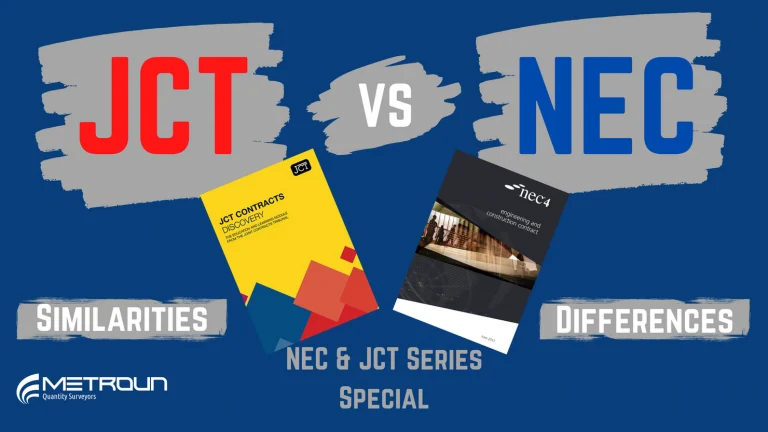If you work or study in the construction industry, you’ve likely heard of JCT and NEC contracts. However, most professionals will only work with one of these in their career, which can make it difficult to compare them. This article provides a clear overview of the main differences between JCT vs NEC, focusing on how each handles time and cost.
Background
The NEC (New Engineering Contract) is the newer of the two, first released in 1993. The JCT (Joint Contracts Tribunal), on the other hand, was established much earlier in 1931.
NEC is often described as a more progressive and collaborative contract, designed to address some of the shortcomings of older forms. JCT, by contrast, is typically seen as a more traditional contract.
Both contracts appoint a representative on behalf of the employer:
- Under JCT, this is the Contract Administrator.
- Under NEC, this is the Project Manager.
Click here to download our selection of NEC tailored Excel templates.
Time
Both contracts require the contractor to submit a programme for the works and for the employer to provide key dates such as Starting Date, Completion Date, Access Dates, and any Sectional Completions.
The difference lies in the level of detail:
- NEC requires much more detail, including concepts such as float and time risk allowance. The accepted programme becomes a live tool used to assess variations, progress, and earned value. NEC also makes it mandatory to keep the programme updated.
- JCT does not specify what the programme should include and does not require regular updates.
A notable NEC feature is the Early Warning mechanism. Either the Project Manager or Contractor must issue an early warning as soon as they become aware of anything that could affect time, cost, or quality. This is usually followed by a risk reduction meeting to agree on actions. Such collaborative risk management is far more difficult without NEC’s requirement for an up-to-date programme.
Cost
For both contracts, the cost to the employer is dealt with in three stages: initial price, variations, and interim/final payments. However, their approaches differ:
- JCT is most commonly used as a lump sum contract, with or without quantities. Time and price variations are treated separately, meaning an extension of time does not automatically entitle the contractor to extra payment.
- NEC offers a range of pricing options, including cost reimbursable and target cost arrangements where profit or loss is shared between employer and contractor. Variations are grouped as Compensation Events, which deal with both time and cost together.
The contracts also differ on risk allocation. For example, unforeseen ground conditions are treated as a Compensation Event under NEC, meaning the risk is shared. Under JCT, this risk typically sits with the contractor.
Summary of NEC vs JCT Contracts
- JCT is usually preferred by employers who want greater control over project delivery and a more traditional balance of risk between employer and contractor.
- NEC is commonly used in the public sector, where collaboration, innovation, and proactive risk management are highly valued. It is particularly suited to major infrastructure and large building projects.
Both contracts have their place in the industry, but their contrasting approaches to risk, time, and cost make it essential for professionals to understand the differences.
Download our NEC tailored Excel templates here.
Why not watch our youtube video on this subject?
References:










